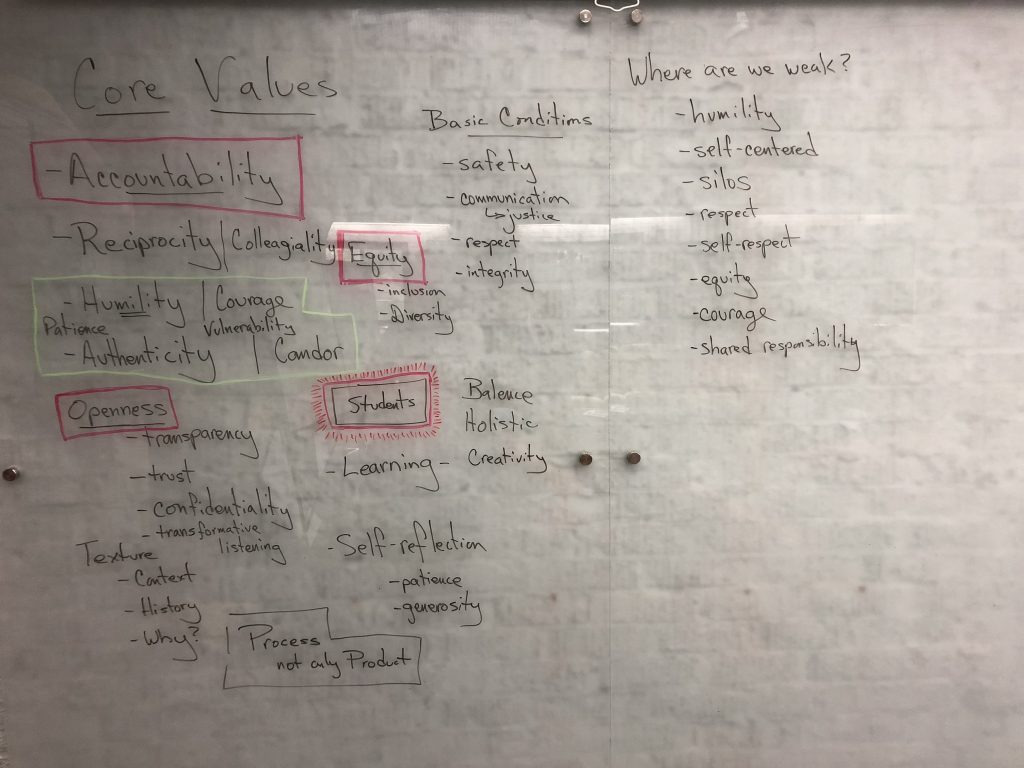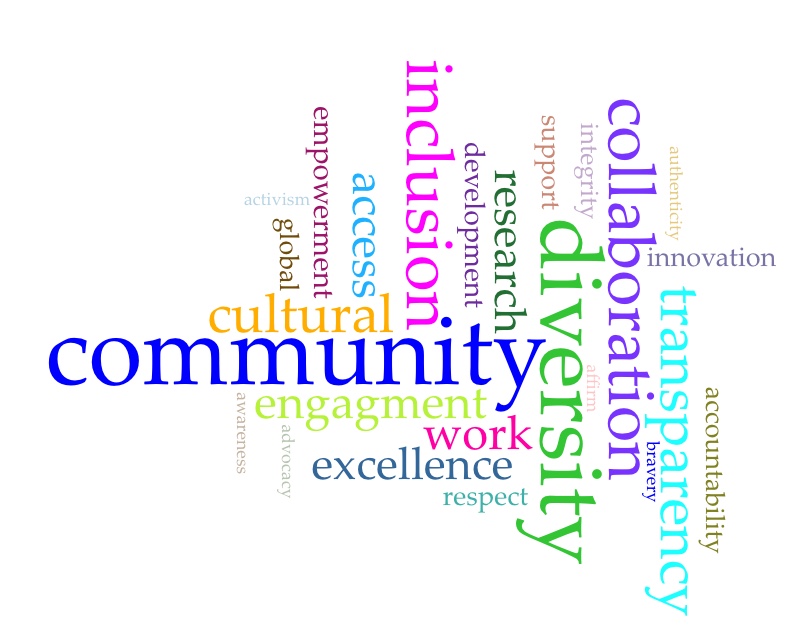In the open letter we wrote to the College of Arts & Letters community in January 2018, we promised to look critically at ourselves, recognize our failures, and rebuild the trust that is required of us. This commitment has led to an intense period of critical self-reflection in the Dean’s Office and across the College in which we have considered the core values we aspire to embody in our work and interactions with one another.
Over the summer and through the fall, all units in the College undertook a values-based planning process in which the core values of each unit were identified and mapped onto the major initiatives each seeks to advance.
The Process
In November of 2017, the HuMetricsHSS initiative held a workshop on the “Value of Values,” in which we considered the core values that shape scholarship in the humanities and social sciences and how those values might be embodied in the practices and products of scholarship. A major takeaway from that workshop was the transformative power of conversations about values in deepening relationships with colleagues and refining our own understanding of our scholarly work.
Drawing on these lessons, we in the College of Arts & Letters Dean’s Office developed Guidelines for a Values-Based Planning Process in which we asked units to:
- Identify the core values that animate your work together, and
- Articulate how these values are put into practice in the main initiatives you plan to undertake over the next three years.
We invited all our units to participate in this process, including administrative units in which staff were fully engaged in the conversations that identified and mapped values.
We had a good sense of the effectiveness of this approach because we had undertaken a similar process in our August 2018 deans retreat and in our September 2018 retreat with department chairs. In the deans retreat we identified three values to which we are committed as a group. Although we have intentionally sought to enact these values in our work this year, I resisted a desire to write explicitly about them at the time, because I didn’t want to predispose units in the College as they reflected on their values and identified the practices that bring them to life.

Values, Weaknesses, Conditions
In embarking on this values based approach to planning, we have been intentional in emphasizing that the process itself is the product. Candid conversations about the values we hold most dear and the initiatives through which we will put those values into practice build the trust we need to advance our work together with integrity.
Now that the values-based Fall Planning process in the College is complete and all units have submitted letters that articulate core values and the initiatives through which they will be enacted, it is important publicly to share and reflect upon the process and some of the results. Openness emerged as a core value, so making our process transparent and reflecting publicly on the values that shape our work is one important way to live up to our commitment to openness.
The Values
A heartening aspect of this process has been both the diversity of values that were identified across the College and the emergence of a group of what might now fairly be called the shared values of the College of Arts & Letters.
Three core values emerged as primary:
- Equity – inclusivity, diversity, social justice, equitable access, accessibility
- Openness – transparency, open process, candor, accountability, open source
- Community – collaboration, collegiality, empathy, respect, connection

These values shaped our 2018 College of Arts & Letters Fall Planning Letter to the Provost as we articulated the initiatives through which we will put these values into practice.
One thing to note is that at the deans retreat in August we articulated equity, openness, and accountability as core values. It was heartening to see that two of the three values we had emphasized as important come up through the Fall Planning process. Where we had ‘accountability’, the College process surfaced ‘community’. The commitment to community engagement that runs through the College dovetails well with the land-grant mission of the University and with our efforts to bring the arts and humanities into the world in ways that enrich our lives together.
Accountability emerged in the Deans retreat as an internal and external check on our commitment to living up to the values for which we advocate. The power of a values-based approach is that it requires us to reflect on what animates our lives and work. Values are anchoring and aspirational; they hold us accountable to what is most important and empower us toward the selves and communities we most want to be. In reflecting on our values, we also recognize the degree to which we fall short of them. We are, in a sense, always on our way toward our core values even as they also shape the ways we live and work together.
In The Price of the Ticket, James Baldwin references a song in which this powerful line appears:
I can’t believe what you say, because I see what you do. 1
Identifying our core values as a College is only the beginning of a longer- term commitment. However difficult those initial values conversations have been, or however inspirational and empowering, the more difficult challenge is for us to live them through the initiatives we undertake. In order to do that, we must hold each other accountable to the values we’ve identified, cleaving close to them as we weave our commitments to one another into the communities about which we care so deeply.
In our 2018 Deans Report: Resilience, we sought to tell the stories of how we are living our values. The video on the Culture of Care captures some of the progress we have made and points to the importance of the work ahead.
- Baldwin, James. The Price of the Ticket: Collected Nonfiction, 1948-1985. 1 edition. New York: St. Martin’s Press, 1985, 594.


2 Comments